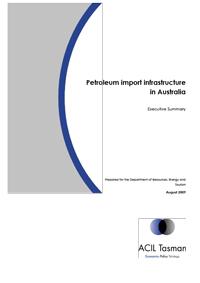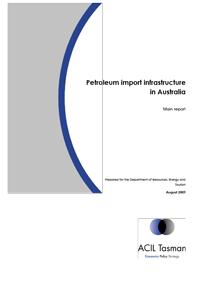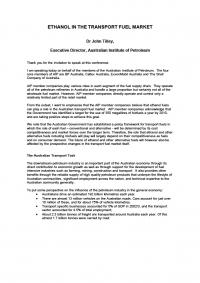Resources
Date
Description
Relying on shipping (for imports) does not increase security risks, and shipping lanes are not easily disrupted. Most countries are reliant on movements of petroleum (crude and product) within and between countries, and particularly so for Australia (in both an export and import sense).…Date
Description
Australia’s import, terminal and storage capacity for transport fuel has increased over time to meet growth in fuel demand There has been significant investment in new and expanded storage and terminal facilities over recent years to meet demand growth in key regional centres, as evidenced in…Date
Description
Subsidising domestic alternative fuel production is not necessary for energy security The reliable supply of conventional transport fuels (petrol, diesel and jet fuel) to the Australian market is underpinned by a diversity of supply options for petroleum products from domestic refiners and…Date
Description
Australia has robust emergency response plans and arrangements Industry and governments fully recognise the potential impacts of a severe national shortage of fuel supplies to business and consumers. Australia has robust response plans for managing a national liquid fuel emergency, which…Date
Description
All fuel users need to analyse and understand their own fuel use and to consider how best to manage the potential impacts of reduced fuel supply Many larger fuel users only hold limited stocks on the expectation that stocks will be held by fuel suppliers, or indeed governments will intervene…Date
Description
The Federal Government has introduced regulation of the quality of petrol and diesel fuel in Australia. The principal drivers of the fuel quality regulation are environmental. The adoption of emerging vehicle engine and emission control technologies is a key strategy in the management of ambient… ,
, 
Date
Description
ACIL Tasman, on behalf of the Federal Department of Resources, Energy & Tourism, has completed a comprehensive Audit of terminals suitable for importing petroleum products into Australia. The findings of the Audit are outlined in ACIL's Tasman's report - 'Petroleum Import Infrastructure in…
Date
Description
Dr John Tilley, Executive Director of the Australian Institute of Petroleum, told the 2005 International Ethanol Conference in Brisbane today that AIP members see a role for ethanol as a fuel extender, replacing some fuel imports and helping to meet the growth in overall fuel demand, as well as a…Date
Description
Three of Australia's peak automotive industry and consumer bodies have urged the federal government to support a maximum limit of10 percent of ethanol in petrol and not to mandate its use. The landmark determination by the three bodies sets a clear agenda for government deliberations. The…Date
Description
The oil industry today supported the announcement by the Federal Minister for the Environment Robert Hill that leaded petrol would be phased out nationally by 1 January 2002. 'The oil companies will be introducing lead replacement petrol progressively in each State, in consultation with State…